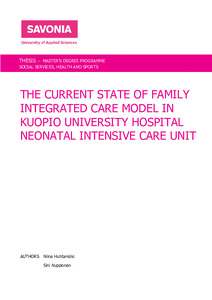The current state of family integrated care model in Kuopio University Hospital Neonatal Intensive Care Unit
Huhtamäki, Niina; Nupponen, Sini (2023)
Huhtamäki, Niina
Nupponen, Sini
2023
All rights reserved. This publication is copyrighted. You may download, display and print it for Your own personal use. Commercial use is prohibited.
Julkaisun pysyvä osoite on
https://urn.fi/URN:NBN:fi:amk-2023112932669
https://urn.fi/URN:NBN:fi:amk-2023112932669
Tiivistelmä
Parental involvement and family integrated care in the Neonatal Intensive Care Unit, NICU is seen as a key value in today’s neonatal intensive care. Family integrated care in the NICU promotes parental engagement and development of parent self-sufficiency. The purpose of this thesis was to study the current state of family integrated care and the use of the current printed discharge plan in KUH NICU. The goal of the thesis is that the results of the thesis research can be used in further development of a digital care path.
The thesis process followed service design methodology and double diamond model working process. The thesis research was done with qualitative approach using thematical interviews as a data collection method. Thematic interviews were carried out with one NICU family and six NICU nurses. Content analysis was made from NICU nurses’ interviews and the results from the NICU family interview were disclosed separately, as it was not enough to be generalised as a part of the content analysis.
According to the thesis research results, nurse led parental guidance and supportive NICU environment are the most important supportive factors of family integrated care (FICare) practices in KUH NICU. The main challenges affecting the FICare practices as described by nurses were related to busy work environment, lack of resources and occasional lack of systematicity when it comes to guiding the NICU parents during different parts of their care path. According to the results, the printed discharge plan material is not in systematic use at the moment in KUH NICU.
The research results describe the current care protocols in KUH NICU as told by NICU nurses. The results describe the well working policies and the challenges related to them. KUH NICU has great operation models and guidelines developed. However, not all seem to be implemented according to the protocol. The task of creating the digital care path for a prematurely born baby in KUH NICU using the service design model will be a goal for future projects. The thesis research results created a foundation for a future digital care path as a novel service model. However, the challenge for future research is to increase NICU parents to participate more actively in the future research and developmental projects, and therefore validate the results of this thesis research from parent perspective.
The thesis process followed service design methodology and double diamond model working process. The thesis research was done with qualitative approach using thematical interviews as a data collection method. Thematic interviews were carried out with one NICU family and six NICU nurses. Content analysis was made from NICU nurses’ interviews and the results from the NICU family interview were disclosed separately, as it was not enough to be generalised as a part of the content analysis.
According to the thesis research results, nurse led parental guidance and supportive NICU environment are the most important supportive factors of family integrated care (FICare) practices in KUH NICU. The main challenges affecting the FICare practices as described by nurses were related to busy work environment, lack of resources and occasional lack of systematicity when it comes to guiding the NICU parents during different parts of their care path. According to the results, the printed discharge plan material is not in systematic use at the moment in KUH NICU.
The research results describe the current care protocols in KUH NICU as told by NICU nurses. The results describe the well working policies and the challenges related to them. KUH NICU has great operation models and guidelines developed. However, not all seem to be implemented according to the protocol. The task of creating the digital care path for a prematurely born baby in KUH NICU using the service design model will be a goal for future projects. The thesis research results created a foundation for a future digital care path as a novel service model. However, the challenge for future research is to increase NICU parents to participate more actively in the future research and developmental projects, and therefore validate the results of this thesis research from parent perspective.
